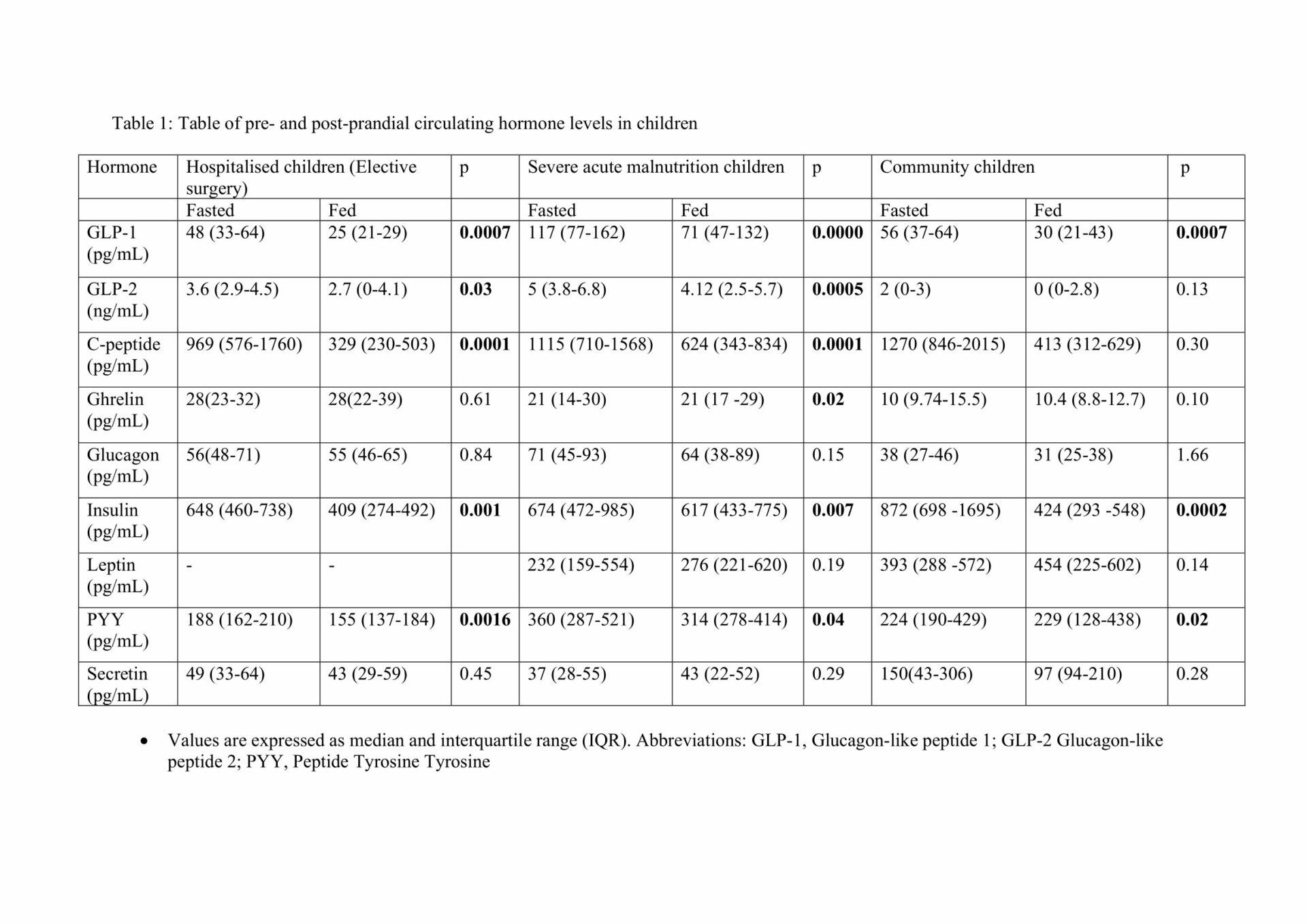Introduction: Malnutrition continues to be a global health challenge with Africa and Asia accounting for the highest prevalence of all forms of malnutrition. Treatment for malnutrition includes the provision of supplemental feeds, which in the case of severe acute malnutrition, involves initial management with F75 feed followed by F100 feed once patients are stable. However, we have been able to show that most children with SAM have severe gut damage which may contribute to malabsorption of nutrients and delay the recovery process. Direct exposure to nutrients results in the release of gastrointestinal peptides with key physiological roles but the effect of malnutrition on hormone production is unknown. We set out to determine the effect of nutrient stimulation on circulating gut hormones in malnourished Zambian children compared to non-malnourished controls.
Method: We measured circulating Glucagon-like peptide 1 & 2, Ghrelin, C-Peptide, Glucagon, Insulin, Leptin, PYY and Secretin pre- and post-prandially in: a) 35 participants with severe acute malnutrition (SAM) admitted to the Lusaka Children’s Hospital, b)19 children admitted to the surgical ward of the University Teaching Hospital for elective surgery and c) 17 children from the community. Blood samples (2mls) were collected into EDTA bottles containing DPP-IV Inhibitor (Merck life sciences) and Pefabloc SC (Sigma). Post-prandial blood samples were collected at least 30 mins after receiving a liquid feed of either F100 (SAM and Community children) or Pediasure. Plasma was analysed using ELISA and the MILLIPLEX Human Metabolic Panel V3. All values are reported as median and interquartile range (IQR). The Wilcoxon matched pairs signed rank test was used to test for a difference in the paired observations and the Kruskal-Wallis ANOVA between groups.Ethical approval to conduct this study was obtained from the University of Zambia biomedical research ethics committee (Reference #: 951-2020 and 2025-2021) and the study was conducted according to the principles of Good Clinical Practice.
Results: There was a significant increase in post-prandial levels of GLP-1, GLP-2, C-peptide, Insulin and PYY across all three groups (p < 0.05;Table 1), while there was no significant change in Glucagon, Leptin, and Secretin. Ghrelin only showed a significant difference in the SAM children (p=0.02) and not in the other two groups. Of the three groups, the children with SAM had the highest levels of fasted GLP-1(117pg/ml, IQR 77-162), GLP-2(5ng/ml, IQR 3.8-6.8) and PYY (360pg/ml, IQR 287-521) while the community children had the highest post-prandial Leptin ( 454pg/ml, IQR 225-602), and fasted secretin (median 150pg/ml, IQR 43-306) and insulin (872pg/ml, IQR 698-1695). The delta in circulating hormones between groups was only significantly different for insulin (p < 0.0001).
Conclusion: Children with SAM have elevated intestinotrophic hormones (GLP-1, GLP-2 and PYY), which may be indicative of an adaptive response to alterations in gastrointestinal structure. However, as GLP-1 and PYY also have glycemic and anorexigenic roles, this elevation may result in decreased appetite and delayed recovery.

